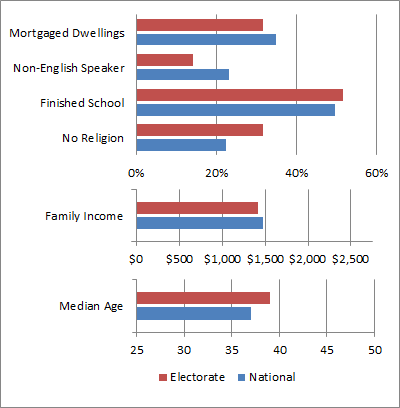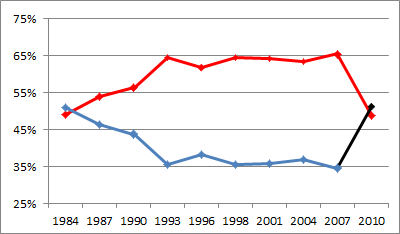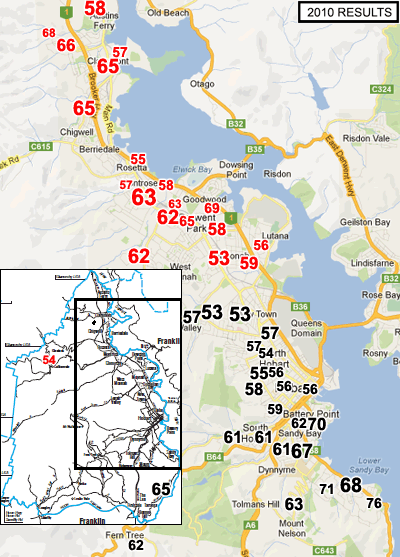Covering the greater part of Hobart, Denison produced one of the most significant results of the 2010 election, sending one of five cross-bench members to the first hung parliament since World War II. Andrew Wilkie achieved his win with just 21.2% of the primary vote, giving him a crucial lead over the Greens who polled 19.0%. The distribution of Greens preferences put Wilkie well clear of the Liberal candidate, who polled 22.6% of the primary vote, and Liberal preferences in turn favoured Wilkie over Labor by a factor of nearly four to one. Wilkie emerged at the final count with a 1.2% lead over Labor, which had lost the personal vote of its long-term sitting member Duncan Kerr.
 Like all of the state’s electorates, Denison has been little changed since Tasmania was divided into single-member electorates in 1903, with the state’s representation at all times set at the constitutional minimum of five electorates per state. It encompasses the western shore of Hobart’s Derwent River and hinterland beyond, with the eastern shore suburbs and the southern outskirts township of Kingston accommodated by the seat of Franklin. It is one of the strongest electorates in the country for the Greens, who managed to increase their vote slightly from 18.6% to 19.0% despite the formidable competition offered by Wilkie. Booth results show a clear north-south divide in the electorate, with Greens support concentrated around the town centre and its immediate surrounds in the south and Labor continuing to hold sway in the working class northern suburbs.
Like all of the state’s electorates, Denison has been little changed since Tasmania was divided into single-member electorates in 1903, with the state’s representation at all times set at the constitutional minimum of five electorates per state. It encompasses the western shore of Hobart’s Derwent River and hinterland beyond, with the eastern shore suburbs and the southern outskirts township of Kingston accommodated by the seat of Franklin. It is one of the strongest electorates in the country for the Greens, who managed to increase their vote slightly from 18.6% to 19.0% despite the formidable competition offered by Wilkie. Booth results show a clear north-south divide in the electorate, with Greens support concentrated around the town centre and its immediate surrounds in the south and Labor continuing to hold sway in the working class northern suburbs.
Labor’s first win in Denison came with their first parliamentary majority at the 1910 election, but the 1917 split cost them the seat with incumbent William Laird Smith joining Billy Hughes in the Nationalist Party. The seat was fiercely contested over subsequent decades, changing hands in 1922, 1925, 1928, 1931, 1934, 1940 and 1943. It thereafter went with the winning party until 1983, changing hands in 1949, 1972 and 1975. The 1983 election saw Tasmania buck the national trend, the Franklin dam issue helping the Liberals return their full complement of five sitting members with increased majorities. Hodgman’s margin wore away over the next two elections, and he was defeated by Labor’s Duncan Kerr in 1987, later to return for a long stretch in state parliament (he is the father of Will Hodgman, the state’s Liberal Opposition Leader). The drift to Labor evident in 1984 and 1987 was maintained during Kerr’s tenure in the job, giving him consistent double-digit margins after 1993 (substantially assisted by Greens preferences).
Kerr bowed out in 2010 after a career that included a four-week stint as Attorney-General after the 1993 election when it appeared uncertain that incumbent Michael Lavarch had retained his seat, and a rather longer spell as Keating government Justice Minister. The ensuing Labor preselection kept the seat in the Left faction fold with the endorsement of Jonathan Jackson, a chartered accountant and the son of former state attorney-general Judy Jackson. What was presumed to be a safe passage to parliament for Jackson was instead thwarted by Andrew Wilkie, a former Office of National Assessments officer who came to national attention in 2003 when he resigned in protest over the Iraq war. Wilkie ran against John Howard as the Greens candidate for Bennelong in 2004, and as the second candidate on the Greens’ Tasmanian Senate ticket in 2007. He then broke ranks with the party to run as an independent in Denison at the 2010 election, falling narrowly short of winning one of the five seats with 9.0% of the vote.
 Placed in the centre of the maelstrom by his surprise win at the 2010 election, Wilkie declared himself open to negotiation with both parties as they sought to piece together a majority. The Liberals took this seriously enough to offer $1 billion for the rebuilding of Royal Hobart Hospital. In becoming the first of the independents to declare his hand for Labor, Wilkie criticised the promise as “almost reckless”, prompting suggestions his approach to the Liberals had been less than sincere. Wilkie’s deal with Labor included $340 million for the hospital and what proved to be a politically troublesome promise to legislate for mandatory pre-commitment for poker machines. This met fierce resistance from the powerful clubs industry, and the government retreated from it after Peter Slipper’s move to the Speaker’s chair appeared to free it from dependence on Wilkie’s vote. Wilkie withdraw his formal support for the government in response, but it has never appeared likely that he would use his vote to bring it down.
Placed in the centre of the maelstrom by his surprise win at the 2010 election, Wilkie declared himself open to negotiation with both parties as they sought to piece together a majority. The Liberals took this seriously enough to offer $1 billion for the rebuilding of Royal Hobart Hospital. In becoming the first of the independents to declare his hand for Labor, Wilkie criticised the promise as “almost reckless”, prompting suggestions his approach to the Liberals had been less than sincere. Wilkie’s deal with Labor included $340 million for the hospital and what proved to be a politically troublesome promise to legislate for mandatory pre-commitment for poker machines. This met fierce resistance from the powerful clubs industry, and the government retreated from it after Peter Slipper’s move to the Speaker’s chair appeared to free it from dependence on Wilkie’s vote. Wilkie withdraw his formal support for the government in response, but it has never appeared likely that he would use his vote to bring it down.
Labor’s candidate for the coming election is Jane Austin, a policy officer with Tasmania’s Mental Health Services, who emerged as the preferred candidate of the still dominant Left. The Greens candidate is Anne Reynolds, an adviser to Christine Milne. The Liberals are yet to choose a candidate, prompting Labor to claim the party proposes to play dead in order to boost Wilkie. A ReachTEL poll of 644 respondents in mid-2012 had Wilkie well placed with 40% of the primary vote to 28% for the Liberals, 17% for Labor and 14% for the Greens.








Crikey is committed to hosting lively discussions. Help us keep the conversation useful, interesting and welcoming. We aim to publish comments quickly in the interest of promoting robust conversation, but we’re a small team and we deploy filters to protect against legal risk. Occasionally your comment may be held up while we review, but we’re working as fast as we can to keep the conversation rolling.
The Crikey comment section is members-only content. Please subscribe to leave a comment.
The Crikey comment section is members-only content. Please login to leave a comment.